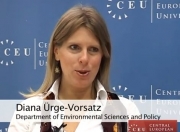Two recent European policy discussions on energy use featured input from Diana Urge-Vorsatz, Professor in CEU's Department of Environmental Sciences and Policy -- more specifically, with her research on the so-called "lock-in effect". This research is indicating that policy-makers and developers are potentially missing out on substantial long-term efficiency improvements, by focusing solely on low-hanging fruit in their approach to the environmental retro-fitting of buildings.
The first of these events took place in the UK at the opening of World Building Week: the Mayor of London, as well as the chief climate negotiator of the UK, were specially questioned on how they deal with the "lock-in effect" in their national and city-wide policy. More recently, in one of the highest possible levels of discussions of the Future EU Energy Policy (with the Energy Commissioner; the Director-General of DG Energy, the President of the European Parliament as well as the Belgian Energy Minister - holding the EU presidency - all actively present) -- CEU represented one of only three experts to contribute to the discussions of the new future policy strategy from the perspective of energy efficiency; among only 12 experts invited from the entire area of energy policy from the whole EU.
Diana Urge-Vorsatz recently sat down introduce herself and some of her current activities, as well as to discuss both of these events in more detail.

